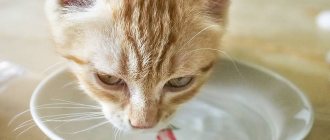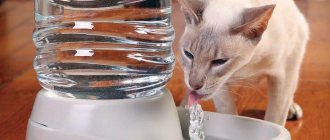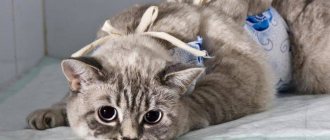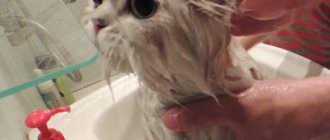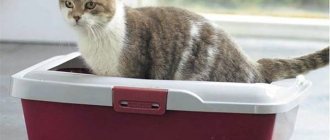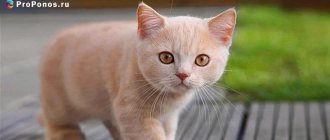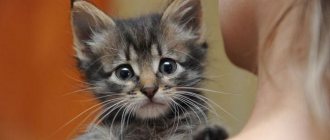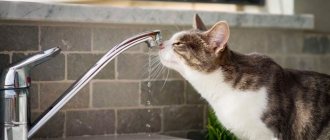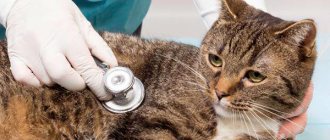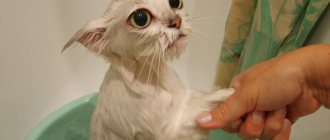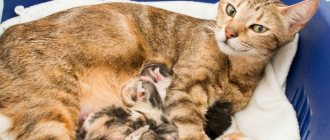Why is it important to take additional tests?
Most pet owners neglect the appointments of veterinarians to undergo certain tests.
And in vain. It happens that symptomatically there are doubts about the diagnosis - additional studies help to more accurately determine the diagnosis. What you can learn from the results:
Urine analysis:
- the presence of kidney problems and with the urinary system;
- urolithiasis disease;
- endocrine pathologies (diabetes);
- liver pathologies.
Stool analysis:
- identification of helminths and/or protozoa;
- indigestion due to enzymatic deficiency;
- tumors in the intestines;
- intestinal bleeding.
Blood test (biochemistry, general):
- abnormalities in the functioning of the liver, pancreas, kidneys, etc.
- the presence of an inflammatory process (acute or chronic);
Ultrasound:
- any deviations in the structure of internal organs;
- correct location of organs;
- neoplasms;
- presence of bleeding, free fluid, inflammatory exudate.
Diet quality and behavioral changes
Does your cat approach a plate of food, sniff it, but not touch the food? It's probably time to change his diet. Cats do not always tolerate routine well and often want variety in their diet. If your cat no longer likes the latter, he will stop touching the food. Try switching from dry to wet food or vice versa, after consulting with a specialist, and try to give your pet only high-quality food.
If all of the above factors do not apply, and the cat still does not eat, only drinks water, is lethargic, and has sunken sides, it is time to analyze his behavior. Are there any noticeable changes in it? Does he meow more, act more aggressive, or is he always lethargic? This can happen, for example, when a new family member appears, moves to a new home, changes in environment, etc. Therefore, your pet may be depressed or stressed and needs time to recover.
To cheer up your cat, give him your attention more often. Many pet lovers find their pets change for the worse when they increase their work hours, and cats, although they seem very independent, can miss their people, especially if they are away from home for a long time.
Stressful situations for a cat or pain syndrome
You feed it its usual food, thoroughly clean the bowl after each feeding, follow all the doctor’s recommendations, but the animal does not develop an appetite. The cat refuses to eat, and the cause of this condition may be stress or pain.
What is this connected with? There is no definite answer; you will have to draw your own conclusions. Stress in cats occurs for various reasons:
- moving to a new home;
- rearrangement of furniture in the house;
- replacing the usual dishes with another;
- the appearance of a new family member in the house, etc.
In such an environment, the cat can feel safe and eat. Be sure to provide her with something to drink. If she continues to refuse food for more than 3-5 days, contact your veterinarian. An experienced doctor will be able to determine the exact cause of the hunger strike and find a solution to this problem.
Non-dangerous causes of loss of appetite
There are many reasons that can cause a cat to eat poorly. Some of them are completely harmless, while others are quite worrying. They range from just a pet’s bad mood to serious health problems.
Why does a cat eat poorly and what affects this:
- suffered stress;
- weather change;
- change of environment or food;
- exacerbation of the instinct to procreate.
These reasons are not serious and are quite easy to overcome. There are other factors as well, but they are not as common. To understand how to restore your pet’s appetite, you need to consider each point in more detail.
Past stress
The mood of cats can be very changeable, and anything can affect it. If the animal has gone through a move, a bath or, for example, a haircut, it is not surprising that stress has fallen on it. In such a situation, the furry friend sleeps a lot and refuses to eat. Don't worry too much about this. After some time, the pet will return to its normal rhythm of life, but if the owner wants to speed up this process, it is better for him to pay more attention to the cat. Any creature feels better from affection, so it is recommended to surround your pet with warmth, play with it or treat it with an unusual delicacy.
Change of weather
As surprising as it may sound, cats are very sensitive to weather changes. As soon as a cloud covers the sun, the animal immediately stops having fun, becomes lethargic and eats poorly. Changes in weather due to season also affect a cat's appetite.
For example, in cold times, in autumn and more often in winter, cats constantly sit near something warm. Fat reserves also help them keep warm, so pets eat every now and then. In the summer, when it gets hot, cats begin to eat much less. This is due to the fact that a large amount of food is digested and gives energy, and in order to spend it, you need to move. The animal is hot from the weather, and unnecessary movements will bring even more discomfort. Therefore, you should not be surprised that your pet eats little and drinks much more in the summer, because he is simply trying to regulate his body temperature.
Change of environment or food
As mentioned above, any changes in a cat’s life can be stressful for him. This also includes a change of environment. It's not just about moving. Even the slightest rearrangement of things or furniture becomes something new and unknown for the animal, which you have to get used to again.
Also, the appearance of a stranger at home can be a reason for a sharp change in the mood of a mustachioed friend. This could be a new person or a pet. If it seems to the cat that the stranger is dangerous, vying for food or affection, then the animal may temporarily close itself off from everyone and refuse to eat until it gets used to the newcomer.
What can we say about drastic changes, if even a new bowl can cause a furry friend to eat poorly. What's in her bowl has a particularly strong influence on a cat's appetite. Often, food becomes the main factor influencing the animal’s appetite. If the food is not to his taste or is of poor quality, the pet may try to express this by refusing.
If the owner is forced to change food for any reason, it is better to do it gradually. You can mix the new food with the old one, so the cat will not notice the catch, and in the end it will completely switch to the new food. It is better to make any changes gradually so as not to shock your pet.
Increased procreation instinct
There come periods when cats put on whole shows. Then they not only eat poorly, but also have strange habits. You don’t need to think long to guess that your pet’s sexual instinct has activated. During estrus, cats almost completely lose their appetite. Hunger strikes can last up to a week, and the animal can lose a lot of weight. However, there is no reason to worry, because when the natural instinct weakens, the pet will have an appetite again.
How long can a cat go without eating, what are the dangers of starvation?
The aroma of food is extremely important to your pet.
In most cases, it is enough to lure a “capricious” cat with the smell of something really tasty to awaken his appetite. Cats are especially impressed by the aroma of meat and fish, while others “peck” at the smell of smoked meats. In a word, everything here is individual, and a good breeder always knows what exactly his pet loves most. Occasionally there are cats whose appetite can be helped by... moving them to an unusual place. Sometimes replacing the bowl with another one works. Finally, the biorhythm of a particular animal also matters. Some cats eat best in the morning, others in the evening, and others are happy to eat anything, but only after the owner returns from work.
Let's summarize. If a cat refuses to eat and drink, then this is a 100% sign of some serious problems with its health. What to do? Of course, take her to the vet immediately. If the animal behaves quite adequately and drinks a normal amount of water, then, most likely, there is nothing to worry about - a voluntary short-term hunger strike will not harm your pet in any way.
Unfortunately, our furry pets cannot tell their owners that something is bothering them at the moment. But they give nonverbal signals about health problems, which an attentive and sensitive owner should recognize in time. One of the most obvious symptoms of health problems in a cat can be a prolonged refusal to eat and drink.
Severe weight loss is very dangerous for a cat.
Even if a long-term refusal to eat food is not associated with a serious cat illness, it can lead to unpleasant consequences for its health. Of these, first of all it should be noted:
- Exacerbation of a chronic disease. If the pet also has other organs, then fasting for a day or more can provoke an attack;
- severe weight loss;
- lack of vitamins, which can affect the overall well-being of the animal.
Particular attention should be paid to the nutrition of a small kitten up to six months old. If adult animals can easily go without food for two days or more, then the baby can die within a day after fasting. Therefore, if a kitten refuses to eat, the owners need to feed it themselves, pouring milk into the mouth from a pipette.
There are many reasons why a cat does not eat or drink and only sleeps. Very often, an animal refuses food and water when pathological changes occur in the body. The cat loses its appetite, becomes lethargic, constantly wants to sleep if it has diseases of the digestive tract or other vital organs. Refusal to eat is a response to pain.
If your cat is lethargic for several days and does not want to drink, this may indicate the onset of the first heat.
The animal simply experiences fear and excitement when faced with a new period in life. Physical changes occurring in the cat's body lead her to confusion, which you may mistake for an illness. Usually this condition goes away after a few days, and the animal returns to its normal life.
A cat may refuse to eat or drink if it has a helminthic infestation in its body. To ensure that your pet always has a good appetite, periodically give him preventive treatment for a parasitic infection.
- Exacerbation of a chronic disease. If your pet has chronic diseases of the kidneys and other organs, then fasting for a day or more can provoke an attack;
- severe weight loss;
- lack of vitamins, which can affect the overall well-being of the animal.
If a cat refuses to eat, there can be many reasons - the onset of the disease, psychological, childbirth and the postpartum period, age, etc. We will try to talk about the most common of them. The main reasons associated with the animal’s health include:
- Presence of worms. There is an opinion that in the presence of parasites, the pet’s appetite increases. This is a misconception - histamines are the source of many infections that can cause permanent loss of appetite.
- Gastrointestinal diseases. These include ulcers, indigestion, and gastritis. They are manifested not only by refusal of food, but are also accompanied by an unpleasant odor from the mouth and diarrhea.
- Diseases of the circulatory system.
- Diseases of internal organs - gastrointestinal tract, liver, genitourinary and reproductive systems, oncological diseases. It is especially dangerous when the cat, in addition to food, also refuses water. This may indicate serious kidney and liver problems (CKD). This is also indicated by changes (more precisely, yellowing) of the skin, signs of intoxication - often foam appears at the mouth. If you notice these signs in your pet, go to the veterinary clinic immediately.
- Bacterial or viral infections cause apathy, diarrhea, vomiting, and fever.
- Food poisoning, intoxication with chemicals, potent poisons. In these cases, the prognosis depends on the substance that provoked the pathology. Often, cats’ instinct tells them how to treat themselves, where to find the herb needed for healing. But in case of severe poisoning by toxic substances, it is not always possible to save the animal even with medications.
If you suspect your pet has a disease, do not try to help the cat yourself; you will only waste precious time.
A healthy adult cat can fast without health problems for up to 5 days, an aging animal - no more than three, a kitten - a maximum of a day, an animal with a chronic disease - no more than two days.
These are approximate dates, taking into account that the animal drinks enough these days. Longer fasting or fasting while refusing to drink is dangerous for the life of a pet.
We suggest you familiarize yourself with: The main breeds of cats with eyes of different colors
A kitten under 6 months of age can die within 24 hours of fasting, so if the kitten does not eat, it must be force-fed.
In addition to the risk of death, refusing to eat can cause the following health problems:
- severe weight loss;
- exacerbation of any chronic diseases;
- avitaminosis.
The most terrible reason that takes away a pet's desire to eat is rabies, an extremely dangerous infectious disease that, without a course of anti-rabies serum, is fatal to humans and animals.
There are three forms of rabies, each of which is accompanied by loss of appetite.
The first, depressive stage, may not be noticed, since the infected cat becomes too affectionate and tries to lick the owner’s hand, which is very dangerous, since the saliva already contains the pathogen and is contagious, despite the absence of characteristic symptoms.
At the second stage, the cat not only refuses food, it develops hydrophobia (fear of water). The animal behaves inappropriately, chews furniture, carpets, swallows various objects, scratches and bites people, even members of the family in which it lives.
It is impossible to diagnose rabies until the cat dies; the disease cannot be treated, therefore, at the slightest suspicion of infection, the animal is euthanized and an autopsy is performed to make a diagnosis.
Symptoms that are characteristic of rabies are observed in the second or third stage of the disease. The cat is afraid of light and water, saliva flows from its drooping lower jaw, and aggression appears, directed at both people and animals.
Animals are not treated for rabies; only preventive vaccinations can serve as protection.
Refusal to eat does not always indicate poor health of the cat. Attentive owners know their animal well, its habits and character traits; it will not be difficult for them to determine how serious the situation is. But there are times when even experienced cat owners get lost when faced with incomprehensible behavior of their pet. Knowing what factors influence a cat’s appetite, you can control any situation and not give in to panic if the animal refuses to eat.
What does a cat's bad breath and drooling mean?
The causes of unpleasant odor include diseases of the oral cavity or teeth; such problems are more typical for cats from 1 to 3 years old. For older individuals, pathologies in the functioning of internal organs are added to these problems. Halitosis is a rare manifestation in animals under 1 year of age, but it does happen.
What to do if your cat smells like rot, acetone or rotten meat?
If an animal smells urine from its breath, it may be due to diabetes. In the case of a rotten and putrid smell, it may be problems with the esophagus, stomach or intestines.
A rotten smell may indicate cheap dry food, which can cause stomach and intestinal diseases. In this case, you can switch feeding to natural food, which should help.
When caring for your cat, you should remember to brush his teeth. If putrid odors occur, it should be taken to a veterinarian to understand the exact cause. Then receive the necessary treatment.
What to do if your kitten smells like rotten fish or rotten eggs
This treatment is usually administered by a veterinarian. For the normal condition of the oral cavity, constant prevention is needed in the form of regular teeth brushing, which must be taught from an early age. This will help avoid putrefactive processes in the cat's mouth.
Bad breath as a sign of worms
To avoid problems with bad breath caused by worms, it is enough to carry out preventive and regular persecution of parasites.
What to do when there is an unpleasant odor and your cat is drooling from its mouth?
Any cat in its normal condition does not have any odors, but if it does, then there are some problems.
Cheap dry food leads to illness. When such food becomes the cause of the smell, the food is made more balanced or the pet is completely switched to natural food.
In a situation with drooling, drool with an odor emanating from the mouth is released, it can be assumed that the cat has a foreign body or has developed stomatitis. Including a bad odor is a consequence of a viral infection, where the cause may be kidney failure. Under such circumstances, you need to consult a veterinarian and add special food to your cat’s diet. For any disease, treatment and necessary medications are prescribed by a veterinarian.
What does the smell from a cat’s mouth mean when changing teeth, after feeding, during the birth and postpartum period, and with chronic renal failure?
A bad odor from a cat's mouth may indicate an incorrect cycle of changing teeth from milk to molars. Also, the milk teeth may not fall out, but the molars have already grown in, which has formed an incorrect bite. Including if food gets stuck in the teeth, it can contribute to the development of a putrefactive process, hence the smell. In the case of extra missing milk teeth, you need to contact a specialist to remove them.
No direct relationship was found with the appearance of odors from the cat’s mouth during pregnancy and the postpartum period. Therefore, you should contact a veterinarian.
If there is chronic renal failure, then the cat's mouth emits ammonia or the smell of urine. Afterwards, you need to consult with a veterinarian and then give the cat special food Renal Special. Contraindications for this food include: growth, lactation, pregnancy. You need to give food for 6 months, then check again. If the problem is eliminated, feeding this food is stopped. If the treatment result from the food is negative, then the cat switches to this food forever.
Why does my cat's breath smell like acetone?
If a cat owner smells acetone from the mouth, this may indicate diabetes. This disease is characterized by increased water consumption and frequent urination.
Consequences of not eating
Even if the cat refused to eat because of a serious illness, this situation can have unpleasant consequences for his health:
- Exacerbation of chronic diseases. If your pet is diagnosed with pathology of the kidneys, liver, or intestines, then refusing food even for a day can provoke an attack.
- Weight loss, which is very dangerous for cats.
- Lack of vitamins, which will lead to a deterioration in the general condition of the animal.
If the cat refuses food and water, you cannot hesitate. Urgently show your pet to a specialist so as not to lose him. It is especially necessary to carefully monitor the nutrition of a kitten up to six months. If an adult animal can go without food for two days or more, then the baby will probably die within a day of fasting. If the kitten refuses food without obvious signs of illness, the owner should feed it milk from a pipette.
- Age. Old cats have a slower metabolism and their body does not need a lot of food. If an old animal does not eat for a long time, but only drinks water, becomes lethargic, lies motionless for a long time, and does not respond to the owner’s voice, these are signs of the animal’s imminent death.
- Prenatal period. On the eve of giving birth, the cat completely refuses food, she restlessly rushes around the house, looking for a convenient place to give birth to kittens. This behavior should not alarm the owner. To make your pet less worried, prepare a secluded corner for her in advance where she will feel protected.
- Postpartum period. Giving birth is extremely stressful for a cat, so there is no need to worry if she refuses food for a while. However, if she refuses water and practically does not pay attention to the babies, a consultation with a veterinarian is necessary. Often, this condition indicates serious problems with the reproductive system, for example, afterbirth remaining in the uterus.
- A nursing cat may not feel hungry for several days. This condition is explained by her fatigue after childbirth. Don't worry if your pet doesn't refuse water and behaves normally - her appetite will soon return.
- Heat. Don't be surprised: people aren't the only ones who don't tolerate heat waves well. In such a situation, the animal refuses food, but drinks a lot of water. The problem can be solved simply - place the animal in a cool room where the air conditioner or fan is running.
Gastrointestinal diseases
Problems with the gastrointestinal tract in cats are determined by the following signs:
- vomit;
- diarrhea;
- discharge containing mucus;
- bloating;
- hard and tense stomach;
- strong odor from the mouth.
Among the most common problems is gastritis or the accumulation of hair in the stomach.
It’s not difficult to deal with a hairball: drinking plenty of fluids and special medications that help remove hair from the stomach will solve this problem (for example, “Phytomins”).
But gastritis is somewhat more complicated; its treatment requires time and effort. At the initial stage, it is necessary to give the cat boiled water and rice water. Then they use activated carbon diluted in water and medications prescribed by the doctor (most often these are stomach drops, Almagel). Food should be low-fat and exclusively unsalted.
Treatment should be carried out only after the doctor has established an accurate diagnosis. This is done by ultrasound of the digestive system or determining the level of acidity of gastric juice.
What does it mean for a pet to refuse food and drink?
There are situations when a cat does not eat or drink for several days, but only sleeps for no reason. If a cat does not eat and therefore loses its appetite, this can be called anorexia. However, an animal's appetite is determined by psychological factors, unlike hunger, which is a physiological phenomenon.
There can be many reasons why a cat does not eat for several days and only sleeps. Often, a kitten does not eat because some harmful processes have begun in its body, that is, a disease is emerging. As a rule, if a cat is lethargic, does not even drink water for a long time and lies in one place for most of the day, then this indicates diseases of the stomach or other main organs. After all, when experiencing severe pain, the animal will not have time to eat.
Note that if the pet is very lethargic during the day and does not even drink water, this may indicate the first heat. Owners think their pet is sick, but this is not the case. In this case, the animal begins to get acquainted with new natural urges, and this can lead it to confusion. This behavior and refusal of water and food may subside within a few days and then return to normal.
If the kitten does not eat anything for a long time and does not even drink water during the day, he is lethargic and does not want to do anything, then your pet is probably sick. Often infectious diseases such as worms are the cause of lack of appetite. To prevent your pet from losing weight and becoming lethargic, it is necessary to give him preventive medications against parasites from time to time.
Below is a list of common diseases among indoor cats. If the cat does not eat anything for a day or several days, is very lethargic and only lies in one place, plus he has also lost weight, then the pet is sick. But what infection is causing this? Let's try to figure it out.
- If your cat has lost weight, it is likely that she has gastrointestinal diseases. The usual illness is accompanied by diarrhea and other unusual discharge. Only a veterinarian can make a more thorough diagnosis.
- This may also indicate liver disease. If the cat is sick, then you need to go to the doctor, and for the future - create a diet that would cleanse this organ.
- Pancreatic diseases. Sometimes a cat does not eat precisely because of this disease.
- Diseases of the reproductive system.
- Blood diseases.
- In addition, this can be caused by various diseases of the mucous system, that is, the throat, nose, mouth, and so on.
But if a cat doesn't eat, it doesn't mean it has one of these diseases. If your pet has lost weight, this may well be due to the fact that he:
- I don’t like the new food (the diet needs to be changed);
- a new place of residence (over time, the cat will adapt, you can help him with this: veterinary stores often sell appropriate medications that help animals when moving);
- other causes of stress (it is necessary to identify specific causes of stress).
If your cat doesn't eat during the day, it's not a big deal. But if this trend continues for a long time, then the pet must be taken to the doctor. It is necessary to take into account some nuances. If you are worried about your pet’s health and don’t know how long it can go without food, consider the following:
- A young and healthy cat can go without food for at least five days, and this will not harm him in any way. After this period, the body will be replenished with the necessary vitamins and carbohydrates and the cat will feel normal again.
- If the cat is already at an advanced age and has stopped eating, then it can go without food for about three days without harm to its health. As in the previous case, after this his body will be filled with vitamins. If the reason for such a diet is not a disease.
- If the kitten is small and has not eaten all day, then it may die of hunger. A small and fragile organism can survive without food for about a day, in rare cases - a little more. Therefore, kitten owners need to immediately sound the alarm if their pet does not eat for at least half a day.
- If you know that the cat suffers from chronic diseases, then you should not let her starve for a long time. Regardless of the stage of manifestation and degree of the disease, a sick pet should not fast for more than two days.
The cat does not eat, refuses to eat for several days and sleeps constantly
If the cat does not eat or drink, but only sleeps, then this can be either a symptom of very serious health problems or simply a temporary phenomenon. It is important to know why this might happen. In our article we will tell you why the cat does not eat anything and how to solve this problem in most cases.
We invite you to read: Important questions about castration of a pet
There can be many reasons why a cat does not eat. Not all of them are cause for serious concern. If you don't know why your cat isn't eating, you need to pay attention to all of its behavior, as other symptoms may point to a specific cause.
Next, we’ll talk about why a kitten doesn’t eat anything in most cases. These most common reasons for a cat not eating anything cover almost 99% of such situations.
Diseases
The disease may be one of the factors why the cat does not want food. In most cases, the cause is various diseases of the gastrointestinal tract, poisoning, parasites, kidney or liver problems. In addition to refusing to eat, they can manifest themselves in other symptoms. These include diarrhea, decreased activity, a constant desire to lie down, and so on.
You cannot treat your pet on your own. If your cat is not eating or drinking due to any illness, then you need to take him to the vet immediately. Only he can make a specific diagnosis.
Poor quality food
One of the reasons why a kitten does not eat may be poor quality food. In this case, your pet usually only drinks water and sleeps, refuses food, but shows a feeling of hunger (meows, asks for other food).
If you have recently changed food, try returning to the old diet that your animal is accustomed to.
And be sure to check the nutritional recommendations for your specific breed, as some have quite sensitive digestive systems.
Satiety
If an animal does not eat, then this may simply be explained by the fact that it feeds somewhere on the side. This is especially common for those animals that roam freely on the street. Unfortunately, many pets find food in trash cans, and they may also be fed by other people.
Therefore, if your pet constantly lies lethargic after returning from a walk and shows no interest in food, then the reason is most likely that he has already eaten somewhere. This can be judged by the absence of symptoms of other, more serious problems, such as weakness, long-term drowsiness, lethargy, and so on.
Fasting day
An interesting feature is that these animals are able to arrange a fasting day for themselves. Perhaps your kitten isn't eating or drinking because he decided to give his bowels a day of rest.
The reason for this need may be temporary digestive problems caused by the fact that the animal moved immediately after eating. Also, the reason may be overeating the day before or too heavy food in the diet earlier.
If fasting lasts less than a day, there is no need to show much concern. But not eating for more than 24 hours can lead to health problems. All obese animals especially suffer from this, as they may develop fatty liver disease.
Sexual instinct
A possible reason for your pet's lack of appetite may be the onset of sexual activity. During the rut, 3 days or all of it, pets often refuse to eat.
Especially if there is a cat or cat somewhere nearby. Their desire to drink usually does not disappear, but they can sleep less often, even for three days.
Another symptom of this behavior can be the well-known cat “songs,” including at night.
What to do if your pet doesn’t eat or drink at this time? Almost nothing. Certain medications can reduce his agitation at this time. The cardinal solution is to do castration. But usually the animal does not completely refuse food during sexual activity, but only eats less.
Stress
Another reason for lack of appetite and the fact that your pet refuses to eat for a whole day can be stress. There are various reasons why cats may feel uncomfortable. For example, you made a rearrangement in the apartment, made repairs.
Also, the cause of stress can be a change in the place of food - if the bowl has been moved. In general, cats prefer to be in peace and quiet while eating, away from people. Therefore, in order for their meals to pass peacefully, it is worth finding a remote place for the bowl, and not a busy corridor, for example.
Pregnancy
Lack of appetite can mean not only that the cat is sick, but also pregnancy. If your pet is really pregnant, you need to carefully monitor her condition and adjust her diet. In the early stages, due to toxicosis, the cat may refuse food. But such a refusal should not last more than a day.
Also, a few hours before giving birth, cats stop eating - this is one of the signs by which you can determine that kittens will soon appear. Almost all cats behave this way before giving birth.
On the first day, the pet may refuse food even after giving birth. But if it continues longer, like 3 days, you definitely need to take her to the vet.
We suggest you read: Is it possible to feed a cat only wet food? Advice from veterinarians
After giving birth, it happens that the pet even begins to lose a little weight and there is nothing to worry about if the breaks in food absorption do not last more than a day.
Consequences of anesthesia
If an operation was performed on an animal under anesthesia, then almost all cats do not eat for 1-2 days, sometimes for 3 days. This is due to the fact that the drugs suppress almost all physiological processes in the body.
The effect, of course, is temporary, but if the condition does not show any improvement after 1 day, contact a veterinarian who will conduct an examination. If even after 3 days your appetite does not appear, you should definitely go to the clinic.
Treatment methods
Depending on why your animal stopped eating, whether your cat has lost a lot of weight or not yet, and other factors, the treatment itself will vary. If fasting continues for more than a day, much less 2-3, you should immediately consult a doctor.
Typically, refusal of water is less common than refusal of food. Without water, an animal can live much less time, so this is the most alarming symptom. If your cat hasn’t drunk anything in a day, you should also visit the clinic with him.
But keep in mind that the reason for refusing water may be that the animal already receives a lot of it - along with food. If there is a lot of water in the food, for example, watery cereals, then the cat may not feel the desire to drink.
If the problem of lack of appetite is a consequence of a disease, then you should always contact a veterinarian. Only he can carry out the appropriate tests and find out what the disease is.
By trying to choose a medicine yourself, you can only worsen the animal’s condition. You can only do this if the cat has a chronic illness. To monitor your pet’s condition, you need to visit the clinic from time to time.
Stress Relief
A common cause of lethargy and lack of appetite is stress. Almost all owners do not understand well that cats have, albeit much simpler than humans, but still a psychology.
For this reason, everything in the routine of life and the surrounding area must be introduced carefully and slowly, as much as possible.
If something has changed dramatically, understand that for some time the animal will not be the same as usual.
Feed selection
Even if a certain food is recommended for your cat breed, this does not mean that your particular pet will want to eat it. There are both individual allergies and simply not wanting to.
In this case, you need to consider several alternative nutrition options that are similar in their content of nutrients.
If the kitten does not eat even after returning to the old diet, then the reason is something else.
Loading …
The video talks about common diseases of the gastrointestinal tract of pets.
It happens that a pet stops eating, consumes only water, and looks very lethargic and apathetic. It is very difficult to find out what is bothering him, because he is not able to tell his owner about his problems.
An examination of the cat's bowls showed that the cat drinks only water (very little) and does not touch food at all.
To get to the bottom of the truth, you need to watch your pet very carefully: he will give obvious signals with his behavior.
An animal may be forced to starve due to an injury in the oral cavity, or if there is a focus of inflammation there.
Examination of the oral cavity.
If your teeth begin to hurt or painful stomatitis ulcers appear, the process of chewing and swallowing food can cause a strong feeling of discomfort. Tartar can also cause a similar reaction. Therefore, a cat in this state can only drink water.
The x-ray shows a foreign body in the throat.
A cat may refuse to drink and eat if a foreign body is stuck in its throat: a fish or chicken bone, or some other object.
This is a very dangerous situation that threatens serious consequences for the animal’s condition!
Foreign bodies can also become lodged in the intestines or stomach, causing gastrointestinal obstruction. As a result, the food that ends up in the intestines rots and severe intoxication begins.
If you notice that your pet has swallowed something dangerous, under no circumstances should you even try to get it yourself!
You can only aggravate the situation by damaging the mucous membrane of the pharynx or pushing the stuck object inside even more. Only a veterinarian can cope with such a problem.
Possible causes of lethargy in healthy animals
Often there are reasons why a cat is lethargic, sleeps all the time and eats little, but it is better to understand each of them in order.
Stress
It is not uncommon for a cat to eat poorly and sleep a lot after a serious nervous shock.
Cats are very sensitive animals, so they have many causes of stress:
- travel by car;
- the arrival of a new family member or pet in the house;
- change of owner;
- repair or rearrangement of the house;
- visit to the veterinarian;
- change of place of residence by owners;
- lack of attention from the owner;
- pain;
- recent surgery;
- visit of guests;
- bathing and other hygiene procedures;
- changes in daily routine;
- the appearance of new and unusual objects in the house;
- first time on the street.
Usually cats cope with this situation quite well without medical help, but they really need the support of their beloved owner. However, in some particularly susceptible cats, stress lasts for quite a long time and can even be harmful to health.
The main physiological signs of nervous shock in a cat:
- urinary incontinence;
- rapid breathing;
- diarrhea or constipation;
- increased cleanliness (a cat can lick itself until bald spots appear on its fur and irritation on the skin);
- yawning too often;
- urinating in inappropriate places (the cat is marking its territory).
Change of feed
Often the cause of a lethargic state and refusal to eat is a change in diet (for example, switching from natural food to ready-made food and vice versa).
In this situation, you should return the cat to its previous food and treat it with some treat. Then the restoration of appetite and a cheerful state will occur very quickly.
Hot weather
Cats do not have sweat glands. They do not know how to cool themselves by opening their mouths, like dogs. Therefore, in the heat, to protect themselves from overheating, furry pets try to lie more in cool places. In addition, they begin to eat less so as not to waste energy on burning calories received with food.
Age
Over time, many owners begin to worry that their once active and nimble cat has become lethargic, eating almost nothing and lying around all the time. This is easy to explain: older cats no longer have as much energy for play; they sleep longer and more soundly than young animals.
If an elderly pet is lethargic, eats without appetite and sleeps a lot, but at the same time drinks water and has the above signs of a healthy cat, then there is no need to worry. However, an older cat should be regularly taken to the veterinarian for examinations to prevent the development of diseases.
Kittens spend almost 90% of the day sleeping until they reach two months of age. If the kitten is lethargic, plays little and eats poorly during periods of wakefulness, then the best solution is a trip to the veterinarian.
Pregnancy
In the early stages of pregnancy, many cats, like people, suffer from toxicosis. They become lethargic, try to move less and more carefully, sleep more and often refuse to feed.
If a cat was mated 3-4 weeks before this condition, then after another 5-6 weeks you can expect an addition to the cat family.
The cat does not eat, sleep and only drinks water: 5 reasons
In the wild, days of successful hunting alternate with failures. Therefore, cats often go hungry. For pets the situation is different. However, a young animal can undergo a five-day starvation diet without harm to its health, provided it has free access to water. For older cats, the critical point occurs after 3 days.
Animals suffering from chronic pathologies cannot go without food for two days. The kitten should not remain hungry for more than 24 hours.
If fasting continues for more than the specified period, lipidosis develops. The body mobilizes fat reserves that rush to the liver, causing its degeneration. The pathological condition often ends in death.
As for the drowsy state, it is typical for cats. The animal accumulates strength from 12 to 20 hours a day in order to waste energy in short moments of vigorous activity. Before going to bed and for some time after waking up, the cat looks lethargic.
There are 5 main reasons for refusing to eat:
- Change of environment, change of diet. Cats are emotional animals. Adaptation to a new place, the appearance of a new pet in the house, and the abundance of other cats at the exhibition distract from food. A change in diet can cause fattening failure. The cat does not like the taste, smell, appearance, consistency, or new dishes.
- The need to cleanse the intestines. In the wild, hunting luck doesn't shine every day. Therefore, the cat tries to eat for future use. Excess food requires drowsiness, decreased activity, and short-term fasting. Another need for cleaning is to expel from their intestines lumps of hair swallowed by licking.
- Sexual heat, pregnancy, lambing. The process of procreation is a more important problem than hunger.
- Heat. Cats do not have sweat glands. The cooling mechanism through the open mouth and protruding tongue is not expressed. Therefore, the animal protects itself from overheating by stopping calorie intake and reducing activity.
- Pathology . In this case, depression and anorexia are accompanied by additional symptoms - fever, digestive disorders, cough, pain reactions, stomatitis, and oral ulcers.
Be sure to read:
The cat eats poorly and constantly sleeps, is lethargic: normal or pathological, the reason, what to do when you need help
Pathological causes of lack of appetite
Having checked all possible harmless versions of why the cat does not eat and only drinks water, and not having found a suitable solution, it is worth thinking about the more negative reasons for such starvation. Lethargy and sunken sides, which become more noticeable every day, are an alarming sign. Does the cat not eat and constantly sleep? He may have a fever due to poisoning, a viral or bacterial infection. It is advisable to have a special rectal thermometer at home and learn how to use it in order to measure your pet’s temperature if necessary.
Examine the cat’s gums and eyes: are there any suspicious changes in them? Are they more red, white, or yellow than usual? It is strongly recommended to find out the animal’s body temperature, its breathing rhythm, pulse and check other indicators. Not every person has such skills, so do not neglect the help of veterinarians: nowadays you can completely call a specialist at home so as not to cause your pet unnecessary discomfort and save much-needed time.
If your cat exhibits alarming symptoms such as:
- heat;
- lack of activity;
- anorexia (severe weight loss and thinness);
- convulsions;
- anxiety, frequent meowing;
- vomit;
- lack of urination or bowel movements;
- blood in vomit, urine or stool,
Contact your veterinarian immediately! An animal may have a serious illness, including cancer, and there is no longer any time to delay. All necessary diagnostic procedures can only be performed by an experienced doctor, who will immediately prescribe the appropriate and safest treatment, medicinal or surgical. The prognosis will depend on certain characteristic features of your furry pet’s condition.
When does a cat, cat or kitten need urgent veterinary help?
Loss of appetite that lasts several days without signs of illness is not considered a pathology. Fasting is not dangerous if it lasts no more than a day in a kitten under six months of age, no more than 5 in an adult cat, no more than 2 in an animal with chronic diseases.
In case of refusal not only from food, but also from water, urgent action must be taken, because dehydration is very dangerous for the animal and quickly leads to a worsening of the disease. If the cat has not eaten or drunk anything for a day and has become lethargic and apathetic, he should be urgently shown to a doctor.
The help of a veterinarian is also necessary in cases where, in addition to lack of appetite, the following are observed:
- increased body temperature;
- vomit;
- diarrhea;
- purulent and inflammatory processes on the skin and in the oral cavity;
- blood in urine or stool.
You cannot do without a doctor if the onset of symptoms was preceded by injuries, burns, or poisoning with chemicals or toxic substances. Consultation with a veterinarian is required after bites from snakes, ticks, etc.
Prevention measures
As you know, the best treatment is prevention. Following these rules will save you from dangerous conditions:
- annual vaccination against feline infections and rabies;
- preventive deworming (medicines against worms are sold only in veterinary pharmacies);
- medical examination of the cat every six months, which includes: examination by a doctor, biochemical and clinical blood tests, general analysis of feces and urine and ultrasound of the abdominal cavity;
- tidy home: tidy household items, pet-safe indoor plants, screens on windows, hidden small items/toys;
- following doctor's recommendations;
- water is freely available: if the cat drinks little, then the solution is a drinking fountain for cats;
- timely sterilization and castration.
Cats love to chew on indoor plants.
Animals need the care of their owners; their lives are completely dependent on their owners. Pets will no longer be able to exist without humans. Your beloved cat will live longer if you give her more time and attention, including attention to her health.
The cat refuses to eat, drink or play due to an infectious or parasitic disease
If the cat is lethargic and apathetic, sleeps a lot, eats and drinks little, he may be sick. Similar symptoms appear with the following infectious diseases:
- Calcivirosis. A widespread disease that affects the respiratory tract.
- Feline leukemia. A dangerous pathology leading to the formation of tumors and inhibition of hematopoietic function.
- Herpes viral rhinotracheitis. A disease with an acute or chronic course, it primarily affects the respiratory organs and eyes.
- Leptospirosis. A bacterial disease that is dangerous to humans. Affects almost all body systems.
- Feline distemper (panleukopenia). A deadly infection accompanied by intoxication, fever, damage to the heart, respiratory and digestive organs.
- Immunodeficiency virus. This dangerous disease affects the nervous and immune systems.
The cause of a lethargic cat may be a parasitic disease. When an animal is sick with a helminthic infestation, it hardly eats and vomits. The pet often visits the toilet due to diarrhea or constipation, his stomach growls, irritation and itching are observed in the anus, and the temperature often rises. Eggs and fragments of worms may be present in the stool and vomit. The animal loses weight, but the volume of the abdomen increases.
If he doesn't eat, doesn't drink and burps
If you notice these signs in your pet, they can be explained by the following factors:
- The cat ate the food too quickly.
- You put too much food in your lunch and your pet ate it all.
- You have given your cat food that is too dense and difficult to digest.
- You switched your pet to a new food without prior preparation.
- The food turned out to be of poor quality and had spoiled.
- It is possible that the cause of the lack of appetite is poisoning due to the cat rummaging through the trash or eating something poisonous.
Try changing the food and see if your pet still refuses to eat.
Health problems
This condition may also be associated with certain health problems. The most common are the following:
- digestive system cancer;
- renal failure of the body;
- diabetes;
- presence of infection in the stomach;
- the presence of parasites in the esophagus.
If your cat has one of the first four diseases, then you should never treat it yourself. Here you need to act differently and at the first sign, immediately show him to the veterinarian. Any other action may endanger the cat's life. You can increase the chances of saving and speedy recovery of the animal if a diagnosis is made in a timely manner and treatment is started. And attempts to help a cat at home can lead to the animal dying due to your experiments.
Of course, the animal will not want to eat the medicine so easily and will break out. To do this, you will have to open your mouth with one hand and place the tablet under your tongue with the other. Make sure your cat swallows the medicine, otherwise you won't achieve anything. After your cat eats the drug, you should wait until she wants to go to the toilet.
When the cat relieves itself, you need to analyze the excrement visually. The presence of parasites in feces means that they are also contained in the animal’s body. If you were unable to detect them, then you should show the cat to a doctor.
What to do?
You can find out how to behave and what to do in such cases below.
If the cat is lethargic
If your cat doesn’t eat and has lost a lot of weight, you need to try changing your pet’s diet. After all, if your pet doesn’t eat during the day, and you just gave him new food or food, then perhaps the problem lies in the food. In this case, you need to do this: add not much of the food she ate before to the new food, gradually reducing its level to a minimum.
Perhaps the cat is lethargic and does not eat during the day due to the dirty bowl in which her food is located. Bowls need to be clean, so they need to be washed every day. Your pet probably doesn't like where his bowls are located. Try placing the bowl in a different place and watch the cat.
If the cat does not eat for a long time and is very lethargic throughout the day, or even several days, and the above tips did not help, then there is only one way out. What to do? Take your pet to the veterinarian, as these symptoms indicate the development of the disease. Only a doctor can determine the real cause.
If he doesn't eat, doesn't drink and burps?
The cause of this condition of the pet is often food, namely:
- fast food intake;
- the cat ate a lot at lunch;
- the food you feed the animal is difficult to digest;
- they began to accustom him to other foods too abruptly and not systematically;
- the food is of poor quality and has already spoiled;
- Perhaps the pet was poisoned by digging in the trash or eating something poisonous.
Try feeding your pet a different food and observe its behavior and condition. The likely causes of this condition may be certain health problems in the animal. It could be:
- digestive system cancer;
- renal failure of the body;
- diabetes;
- presence of infection in the stomach;
- the presence of parasites in the esophagus.
https://youtube.com/watch?v=gisSfAoo_HQ
If you think that your cat has parasites in its stomach, for example, worms, you can check it yourself. How to do it? Very simple. Go to the veterinary store and buy. Sometimes it can be mixed with water or added to food. More often it should be given to the pet in its pure form.
This is not easy to do, especially when the animal breaks out. With one hand you need to open the cat's mouth, and with the other you need to put a pill in it. Make sure she swallows it, otherwise there will be no point. When the cat has eaten the drug, wait until it goes to the toilet.
After the animal has left excrement in the tray, it is necessary to evaluate it visually. If there are parasites in the animal's body, they will be visible in the cat's feces. If they are not there, take your pet to the doctor.
If the fluffy doesn't eat or drink, his nose is dry
It is considered to be the initial sign of the disease. This is true, but not always. After sleep, your pet’s nose will be dry, no matter how much you want it to be otherwise. But if the lack of appetite is accompanied by this factor for several days, then there is only one way out - take the animal to the veterinarian.
Touch your pet to see if he has a fever. If this is the case, take the animal to the doctor immediately.
What to do for treatment
If the cat stops eating, then first find out the reason. Sometimes it’s enough just to change the bowl or food. If a pet has experienced a stressful situation, it needs help to adapt after it.
The situation is more complicated with medical factors. Any of the reasons described above requires treatment, but nothing can be done at home.
The pet is taken to the veterinarian, who orders an examination to identify the disease that caused the loss of appetite.
The treatment regimen, selection of medications and optimal dosage for the cat are determined by the doctor, based on the diagnosis.
Common reasons
When a cat has been ignoring food for several days and has lost a lot of weight, the situation can end badly if the factor that influenced the animal’s appetite is not found.
- viral infection;
- intoxication;
- toothache;
- loss of smell, etc.
Some causes occur rarely, while others affect every second pet. Even a common cold can cause a lot of trouble.
Factors that negatively affect appetite
| Cause | Description |
| Damage to the mucosa | Playful cats often grab various objects in their teeth and may accidentally swallow them. A foreign body sometimes enters the stomach along with poor-quality food. Fish and chicken bones can damage the mucous membrane. Injury causes pain and provokes the development of inflammatory processes (sometimes bleeding) |
| Anorexia | Loss of appetite is common in small animals and is one of the signs of the disease. The reasons may vary from infection to cancer. Most often, anorexia, accompanied by drowsiness, manifests itself in liver diseases |
| Problems with the gastrointestinal tract | Malfunctions in the digestive system can be caused by gastritis, ulcers and other pathologies, due to which the production of bile is disrupted. Another reason is wool accumulated in the stomach. Most often occurs in smooth-haired pets. When licking, the cat swallows hairs that stick to the walls of the stomach and roll into lumps. |
Such problems are difficult to diagnose by visual inspection. A whole range of biochemical and hardware studies will be required.
Therefore, if the cat has become lethargic and refuses to eat, it must be taken to a veterinary clinic.
Reasons for refusing to eat?
Do not force-feed your cat unless you know the reasons for refusing food! In many situations, hunger will save your pet from complications. A lot can be said about the reasons for refusing to eat, since there are hundreds of them. Let's look at the most popular ones.
During transition periods - the end of winter, the beginning of summer, the cat may not eat on its own initiative. A healthy cat monitors its weight and loses excess fat before the season in which increased activity is needed. A young cat may refuse to eat due to puberty, hormonal imbalance, fatigue, etc.
If your pet played very actively the day before, jumped, ran, and could not calm down, there is a high probability that he feels so-called muscle soreness. It is known that cats may refuse to eat due to pain.
Even nursing cats may refuse to eat, but the reason is still the same - fatigue
It is more important for your pet to get a good night's sleep and rest; she will be able to eat afterwards. In a state of deep sleep, a cat’s immune system works at full strength.
Some suffer from weather dependence and may refuse food due to headaches. This can only be confirmed by observing your pet during weather changes and sudden changes in atmospheric pressure.
Stress is one of the most common causes of hunger in cats. The problem is that it is difficult for an owner to identify stressors unless they are obvious. You need to start from the fact that the cat is irritated by any changes in the daily routine. For example, if you have noisy guests, and then the cat refuses to eat, the reason is most likely stress.
Worms are the cause of constant intoxication of the body. A cat that is in a constant state of poisoning is unlikely to have a good appetite. Prevention of worms should be carried out at least once every 3 months, even if your pet does not go outside. With prolonged infestation by worms, the opposite picture can also be observed - a strong, perverted appetite. At the same time, the cat is constantly hungry, eats a lot and loses weight. The reason is metabolic disorders and severe vitamin deficiency.
Diseases of the teeth and oral cavity - a pet may look completely healthy in appearance, but refuse to eat due to toothache. Elementary, it is painful for a pet to chew if his tooth is destroyed, pulpitis has developed, or the mucous membranes of the oral cavity have been irritated. Carefully inspect your pet's mouth for irritation. A putrid odor from the mouth indicates the process of decay of the tooth(s) or serious digestive problems.
Other situations
Problems with the reproductive system
Animals have great difficulty undergoing the rehabilitation period after castration or sterilization. More often than not, they simply hide in a distant dark corner and lick their wounds there. There is no need to disturb them in this state.
All that is required is to place the litter tray close and provide fresh drinking water.
The same rules can be applied to the period of the first heat in a young cat.
Stress
In the lives of our tailed friends, there are also difficult days, and even prolonged depression.
It can be provoked by:
- moving;
- parting with a beloved owner;
- separation of kittens from their mother (in this case it will be difficult for both the kittens and the cat itself).
If you notice that your cat is sad all the time, shows no energy and mostly sleeps, then you need to let her come to her senses. For a day or two, she may well arrange a fasting day for herself.
If food intake does not begin on both the third and fourth days, you should be concerned about the animal’s condition and start feeding it, at least through force.
After vaccination, the cat is lethargic and sleeps, what should I do?
Do not worry if after the administration of the drug the cat feels lethargic and does not show activity.
After vaccination, the cat is lethargic and sleeps, what to do:
- This often happens after vaccinations. After all, substances are usually administered that provoke a mild stage of the disease, thereby forming immunity. There is nothing wrong with reducing your pet's activity.
- Take care of him, let him drink a lot of water and pamper your pet with goodies during this period. After vaccination, cats refuse to eat, so you can lure them with some treats that you rarely give.
- Decreased appetite and lethargy are observed after the administration of anthelmintic drugs. If you give your cat a dewormer, don't be surprised if she becomes lethargic and refuses to eat. Such medications have a large list of side effects and contraindications. Among them are: lethargy, lack of appetite, and decreased activity.
Resting
Intestinal obstruction
If your pet constantly screams during examination, this does not bode well: perhaps this is a symptom of intestinal volvulus, the presence of a hard, impassable object that has entered the intestines and blocked all the passages. Naturally, in such a situation the cat refuses to eat. How to feed an animal? Before examining the cat by a specialist, it is strictly forbidden to try to force feed it, pour any liquid into its mouth, including milk, or give a laxative. This can cause intestinal rupture, and the animal will die from internal hemorrhage.
Urgently seek help from a large veterinary clinic, where they will conduct all the necessary examinations, take x-rays and take tests. If the x-ray does not show any pathology, the doctor will prescribe a repeat x-ray with a radiopaque solution. The cat is immediately given barium chloride, since at least eight hours must pass after taking the marker for a high-quality photograph.
If no clear obstruction is detected, but the cat refuses to eat and has lost a lot of weight, then in the next 24 hours he will be prescribed IVs and intramuscular injections. These measures will make it possible to artificially support the body until digestive functions return to normal or until surgery becomes a vital necessity.
When is veterinary help needed?
If the cat refuses to eat, is active, drinks a lot and there are no changes in its behavior, then there is no need to worry. When the pet has lost a lot of weight and the clinical picture is complemented by other dangerous signs, then it is impossible to do without the help of a specialist. At the veterinary clinic, the animal will be examined and a comprehensive diagnosis will be prescribed, including the following manipulations:
During the consultation, the veterinarian will prescribe a urine test for your pet.
- urine and blood analysis;
- laboratory examination of stool;
- ultrasound diagnostics of internal organs if their dysfunction is suspected;
- bacterial culture of urine.
Food poisoning
If the cat is lethargic, has stopped eating, and is constantly vomiting, the reason is obvious - severe food poisoning.
How an animal can be poisoned:
- Stale food – be sure to monitor your pets’ diet. After each meal, it is recommended to throw away the remaining portion and leave the bowl clean. In a warm environment, destructive microorganisms quickly develop - the causes of frequent poisoning.
- Household chemicals - for example, leftover dishwashing liquid. It is necessary to rinse the bowl thoroughly under running water after each wash.
- Medicines - in the instructions for use of each drug, the dosage is clearly calculated in accordance with the weight and age of the animal. Exceeding the permissible limit is very dangerous.
- Vapors of paints and other chemicals - during repairs or work with strong-smelling substances, the animal should be kept away. This way you will protect him from poisoning and preserve his sense of smell.
What to do in case of poisoning? Give plenty of fluids and liquid food - weak broths, weak porridges, slightly diluted fermented milk products.
It is quite possible that the cat will not want to eat. Try to feed her at least in very small portions - this way toxic substances will be eliminated faster when going to the toilet.
